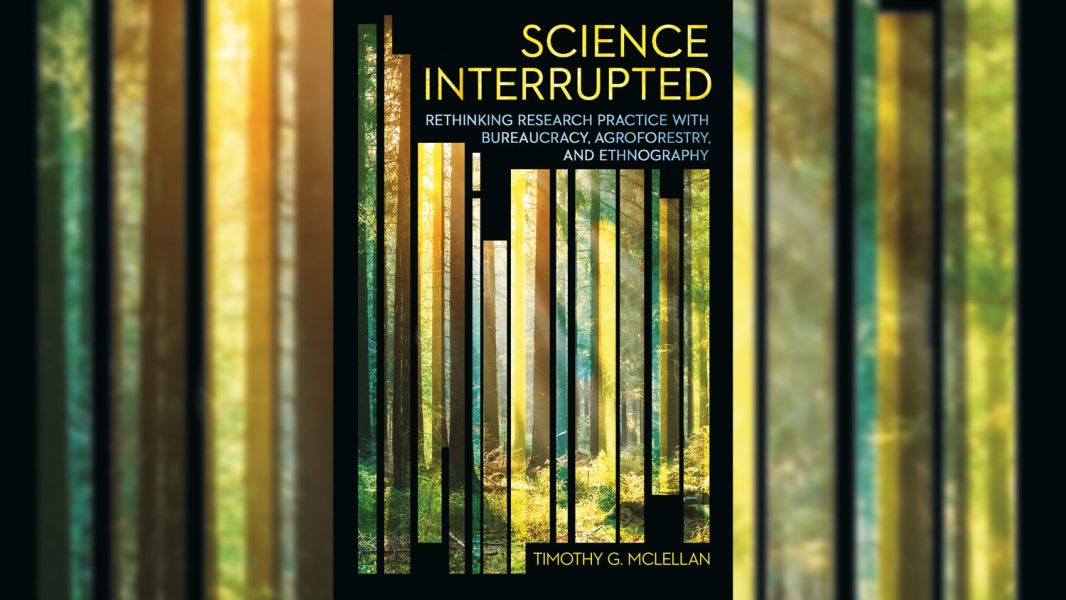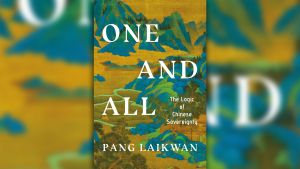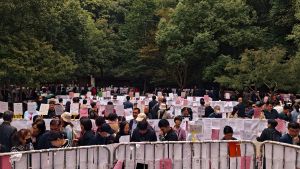
Science Interrupted: A Conversation with Timothy G. McLellan
In Science Interrupted: Rethinking Research Practice with Bureaucracy, Agroforestry, and Ethnography (Cornell University Press, 2024), anthropologist Timothy G. McLellan investigates and breaks down audit cultures and the practice of dealing with bureaucracy within scientific research. The book takes place within a transnational agroforestry research institute in southwest China, the Institute for Farms and Forests (IFF), but rather than choosing to centre his analysis on China, McLellan uses his field site and his experience of being embedded within the institute for more than two years to make broader observations about interruptions and problematics within today’s scientific practice in academia and beyond. McLellan then provides many ideas and aspirations for how science might be reformed to adjust to and work better with vulnerability and interruption, showing how these challenges could be used to benefit research for environmental change.
Brendan A. Galipeau: You mention early in the book that you don’t necessarily take issue with the problem of bureaucracy per se and that you believe bureaucracy does have its place and usefulness, even though perhaps more flexibility (what you call interruption and vulnerability) within and against bureaucratic apparatuses is needed for researchers who seek to create environmental change and a better world. This certainly goes against most scholarship, ethnographic or otherwise, on this topic, especially in China, where, as you state on multiple occasions, bureaucracy causes a lot of mafan (麻烦) for researchers (including yourself) to deal with. Can you elaborate on how you came to view bureaucracy as something that we should learn to work with and around and how this novel approach informs your thinking throughout the book?
Timothy G. McLellan: A key thread that runs through the book is what I call ‘thinking ethnographically with bureaucracy’. That’s a kind of thinking in which I take some of the logics of bureaucracy and of IFF colleagues’ encounters with bureaucracy and repurpose them as tools for thinking about research practice. An example is the inspiration I take from a planning and evaluation tool called ‘Theory of Change’. From a certain perspective, Theory of Change is just one more mafan or bureaucratic headache with which scientists at IFF must deal. But from another, Theory of Change is a provocative way of thinking about and challenging what motivates scientific research and how it is we imagine our research shaping the world around us. It prompts us to ask, for instance: ‘Whose behaviour is our research going to change and how?’ When that question is tied to a bureaucratic evaluation regime, it tends to become a demand for scientists to demonstrate their power to mould the world to a preconceived vision—to demonstrate what contemporary research institutions refer to as ‘impact’. But borrowing and reworking Theory of Change as a theoretical framework for anthropology, we can gain a lot by asking that kind of question of scientists and of ourselves. Asking Theory of Change–inspired questions of IFF colleagues helped me to understand their commitments to social and environmental knowledge and transformation. Importantly, it also helped me to appreciate how their commitments subvert the hubris and Machiavellianism attached to institutionalised expectations for impact. In this respect, thinking with bureaucracy can mean asking a version of the questions that bureaucracies already ask, but it means doing so in a way that opens a very different set of responses to the ones that bureaucracies themselves anticipate.
In terms of where that approach comes from, this is a classic anthropological approach to ethnography. As I describe in the book, to many anthropologists, ethnography is not simply a mode of data collection but also a practice through which we develop theories and concepts. It is perhaps a little unusual to apply this method to something so hated as bureaucracy, but I have tried to show that even in this context it can be generative. Thinking ethnographically with bureaucracy helped me gain a perspective on research practices and research institutes, and it helped me to think about questions that are important to me and hopefully to others, too—not least: what practices and institutions might allow us as scientists and academics to contribute better to the building of a more just and more liveable world?
I do, however, distinguish this method of thinking ethnographically with bureaucracy from an argument in favour of bureaucracies as we find them today. Maybe we can work with existing bureaucracies and maybe we must, but I would be happy to tear them all down tomorrow. At the same time, I am suspicious of a line of argument that assumes that what comes after tearing bureaucracy down is a return to some golden age of scientific autonomy. This is a way of thinking that I have encountered among academics in China and elsewhere, and I can empathise with it: bureaucracy is exhausting and the call to reclaim autonomy is an intuitive response. But the past is no model for the research practices we should want to build and a generalised notion of autonomy is the wrong goal. Yes, we must resist and dismantle audit cultures, but instead of seeking renewed autonomy, our goal should be to increase meaningful opportunities for engagement with and entanglement in the world around us.
In the book, I talk about such opportunities in terms of ‘interruptions’ and ‘vulnerability’. These are concepts that I build out of IFF colleagues’ experiences and frustrations with bureaucracy—including their conceptualisation of bureaucracy as a ‘mafan’ or ‘headache’. I would sum up an ‘interruption’ as a stoppage or hiatus during which scientists surrender control of their research. When it comes to encounters with bureaucracy, interruptions are often as meaningless as they are infuriating. But there are also many times when momentarily surrendering control of a research project is extremely generative. In this respect, I think about the destructive and creative potential of being interrupted alongside Erinn Gilson’s (2011: 310) ambivalent definition of ‘vulnerability’ as ‘a condition that limits us but one that can enable us … [too, as] a condition of openness, openness to being affected and affecting in turn’. Ultimately, I draw lessons from my fieldwork in China about what it might take for us to get better at being interrupted by and vulnerable to communities beyond the academy. We will probably need some form of bureaucracy to help us do that. But a bureaucracy that fosters meaningful interruption and vulnerability would look very different to the audit cultures we know today—and not just in the degree of flexibility they allow.
BG: Why did you decide to move the book away from China Studies and dialogues about China to focus more on the topics of science and research at large? A lot of the ideas and situations you discuss in your ethnography can certainly be applied elsewhere, as you state with increasing audit cultures from funders and other actors in places such as the United States and the United Kingdom, but bureaucracy and audit cultures in China are unique, as those of us who have worked there know well. What things about China’s audit culture helped you to frame a more universal argument?
TM: One reason I foreground literature on science and universities elsewhere in the world is the reactions I received when I began to describe my research findings to colleagues and mentors in UK universities (not least at the University of Manchester, where I was fortunate to find a wonderful intellectual environment in which to begin writing the dissertation-turned-book back in 2016). Very often, academics I met in the United Kingdom, and later elsewhere, would compare what I was describing in China with their own experiences as academics buried in bureaucracy. They drew my attention also to resonances between the evaluation of research ‘impact’ that I had encountered in China and the emphasis on impact within the United Kingdom’s notorious Research Excellence Framework. Those conversations inspired me to relate my ethnography to critical university studies and audit cultures literatures. Notwithstanding the fact that (as is the case for many fields) much of those literatures focus on Europe and the Anglophone world, these are fields with which China Studies scholars can and should engage.
A second reason I decided to foreground engagement with literature and themes beyond China Studies is the relationship between Science and Technology Studies (STS) and China—and perhaps between STS and Asian Studies more broadly. I was driven by frustration with an assumption that I kept coming up against: that scholars of science in China should necessarily focus on the distinctly or uniquely ‘Chinese’ aspects of the cultures they observe. (Kenji Ito’s 2017 chapter, ‘Cultural Difference and Sameness’, offers an excellent critique of a parallel expectation for historians of Japanese science.) One of many problems with this expectation is its lopsidedness as it relates to STS: the Americanness of a lab in the United States can be a legitimate object of STS analysis, but it is certainly not an obligatory one in the way that many imagine it to be for Asianness or Chineseness. Where Chinese scientists must be marked by their nationality, US scientists need not be. One reason this Othering matters is its connection to a prejudice held by many of us in the academy that scientists and academics from the Global South need not be taken quite as seriously as their counterparts in the Global North. This is evident at IFF where a common pattern of transnational collaborations differentiates the implicitly junior ‘local research partners’ from the more esteemed ‘international’ or unmarked researcher. (A similar dynamic is brilliantly captured by Crystal Biruk in their 2018 book, Cooking Data.)
Rather than develop an explicit critique of that Othering (though there are aspects of one in Chapter 5), I wanted to try to disrupt this hierarchy through the book’s ethnography. One part of doing that was to consciously frame science at IFF in relation to a global rather than specifically China-focused STS literature. Jiaolong, for example, is an IFF scientist whose ideas and practices I frame in relation to feminist STS and feminist science. I try to do justice to the specific context of Jiaolong’s journey as a scientist—I describe, for example, the connection between her scientific aspirations and her upbringing in one of the rural communities that IFF research is meant to serve—but I place that context in relation to the ways in which feminists have brought the personal and the scientific into relation elsewhere in the world. I felt that this would be the best way to get readers to take Jiaolong seriously, not as evidence for what might or might not be unique to Chinese science, but as a feminist scientist whom any one of us with aspirations to transform research practices might learn from and with.
BG: Can you also talk more about your interesting role with the IFF and how you came to this position for your fieldwork. It appears you essentially wore two different hats for two years, observing and learning about the inside workings of this agroforestry research institute. As you took part in various research projects, survey administration, and other tasks, you were simultaneously trying to write about the research in which you were taking part as an observer. What was this balancing act like, especially with all the bureaucracy that working within China presents to foreign researchers?
TM: ‘Two hats’ is a good way of putting it. As I would explain to my colleagues at IFF, this is a pretty common mode of anthropological fieldwork. If I had instead wanted to study rubber farmers, for example, I might have embedded myself in a rubber farming community and done my best to take part in rubber cultivation and other aspects of day-to-day life. Of course, that kind of approach isn’t always possible—or necessarily desirable. But I was fortunate enough that IFF had use for a social scientist like me and that IFF colleagues were generous enough to let me wear those two hats at once.
From a bureaucratic point of view, working for IFF probably made life easier. I owe a lot to IFF colleagues who ran around on my behalf fixing visas and the like. But there were still plenty of headaches and plenty of times things didn’t go to plan. Those bureaucratic headaches were of course data for my research, but I still found them infuriating to deal with. I remember one particularly frustrating episode when a colleague tried to cheer me up by saying: ‘At least you have another chapter for your dissertation.’ He had a point.
I do, nevertheless, have some reservations about my two-hats approach. When I conducted work on behalf of IFF, I usually did the best I could to satisfy what IFF expected from social science. That’s something quite different from the mode of anthropology in which I was trained. I often wonder what my role would have looked like if I had been more assertive in pushing for and experimenting with my own ideas of what anthropological collaboration with the sciences should look like. I don’t have a clear answer to that question, but it’s something I am trying to grapple with a little more deliberately in my new ethnographic research with landscape architects.
BG: I was especially struck by your observation that there is both innate flexibility for dealing with bureaucratic problems—such as securing proper funding for hosting a conference in China or using guanxi (关系, ‘relationships’)—and extreme difficulty because of the vulnerability that public officials and civil servants face when they don’t follow rules properly. This resonates with my own experience, as I have dealt with similar situations over the years. Can you talk a bit more about this contradiction and how it informs your overall analysis and thinking about improving audit cultures for better scientific practice and planetary change?
TM: There is of course an enormous amount written about the role of guanxi in creating flexibility and wiggle room in bureaucracy. At IFF, however, guanxi is a relatively marginal strategy for navigating bureaucracy. One thing I wanted to do therefore was to focus on cases where people generate flexibility in the system without resorting to guanxi. One example is the conference funding you mentioned. Under the guise of preventing the extravagant liquor-fuelled banqueting for which civil servants are notorious, public research institutes in China have imposed impossibly frugal limits on how much scientists are allowed to spend hosting conferences. To get around that, you don’t rely on guanxi. Instead, you fudge the reporting documents: you produce documents to show you are working within the rules even when you are not. One thing that is striking about this kind of trickery is how transparent it is. Everyone knows that everyone is doing this. What was most surprising to me, however, was that in some instances bureaucrats seemed to prefer a fudge to honest paperwork. There was one case where a bureaucrat rejected an expense report that was truthful and within the rules, but then accepted a subsequent report with fabricated receipts for the same expense.
In retrospect, that was a surprising situation only because I am used to placing value on the veracity and accuracy of what a document tells me. What my colleagues at IFF helped me to appreciate, however, was that for bureaucrats the veracity or substance of information contained in a document is not a priority. What really matters to bureaucrats is the ability of a document to shield them from potential harm—from vulnerability. A bureaucrat looking at an expense report is not asking: ‘Do I believe what the applicant is telling me in this document?’ Rather, they are asking something like: ‘What are the chances this document is going to raise suspicions in the event of an audit? What are the chances that a superior will question my decision to approve this expense? If the applicant is up to anything untoward, what are the chances that approving their paperwork would get me on the hook, too?’ This anxiety and the associated desire to evade vulnerability are important for understanding the practice and experience of bureaucracy in China.
As you mention though, I also take this perspective on bureaucracy as a starting point for thinking about research practices. In that respect, the idea of bureaucracy as a systematic evasion of vulnerability is reminiscent of how many academics (in China and elsewhere) themselves engage with audit cultures. In the book, I relate this to IFF colleagues’ experiences with their own grant reporting, but here I’ll share a story from a North American colleague. This colleague had just won a tax-funded research grant when they received a phone call from the grant officer instructing them to rewrite their abstract. The new abstract, they were told, must remove anything that might be a red flag to right-wing legislators looking for research projects to lampoon as examples of wasted public funds. It strikes me that this grant officer was playing a similar game to the anxious bureaucrats that I encountered at IFF: the grant abstract and the expense report are both documents crafted to evade vulnerability.
Obviously, I’m not in favour of right-wing legislators defunding research grants, but there was also something discomforting to me about the parallel. It got me thinking about moments when scientists not only evade vulnerability—such as in a grant abstract or grant report—but also actively embrace it, such as in peer review or a participatory workshop. Indeed, that is a big focus of the second half of the book. I explore the ideas and activities of IFF colleagues in a way that points both to how vulnerability is crucial to research and to what making our research practices more vulnerable might entail.





